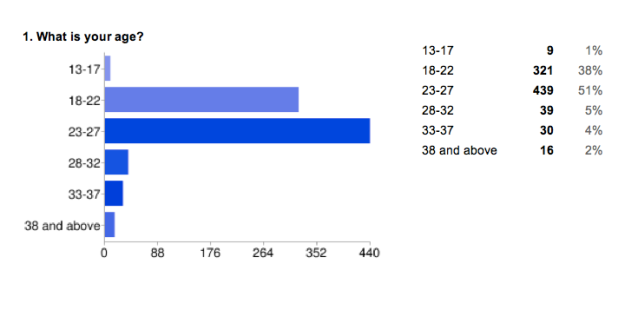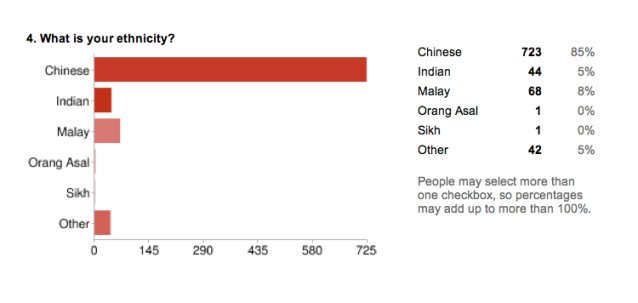This survey was posted online from June 11 to June 26, 2010. I received a total of 854 responses, and the breakdown of answers by question are below:
Clarifications:
1. Some of these responses were not factored into the statistical analysis, eg. anyone who answered ‘no’ to the question “Are you studying outside Malaysia, or have studied outside Malaysia in the past?”.
2. A few questions do not have breakdowns because they were short answer questions.
3. There were a total of 26 countries that respondents studied abroad in, and years abroad range from 1-18.






























Just a little concerned that your survey has a significant racial and age bias. I think that is something that might be improved further. While it is good research and sheds some light on certain things, it is dangerous to extrapolate this beyond its limits.
Hi Shawn, yes I’m really aware of the racial/age bias. They are also not random, but that’s also because (as I mentioned in suggestions area) there isn’t publicly available data on Malaysian migrants. So what we have to go on is mostly World Bank estimates and anecdotes. However, under statistical modeling, assuming this is a random sample, it should on average reflect the population.
On another point, I read your blog with interest and was surprised to find that you are the founder of Aeste after coming back from abroad (right?). I’d be really interested in talking to you about your motivations for coming home, how you view the Malaysian situation etc. Feel free to contact me at evelynw89@gmail.com.
may i know how u determine the factors on the questionnaire? what theory r u based on to do tis research? can u upload more about the dimension of those variables?
Diplomatic, tactful and academic research. Well done.
Root cause of high student chinese brain drain? Unequal opportunity in Universities.
Root cause of students not returning? Unequal laws in business, ie quotas and Malay priority.Government intervention on high profile business.
Silver lining for chinese student not getting a place at local Uni? Better Uni and opprtunity outside. But at a cost of uprooting.
I support the government initiative to enrich the malays. But I do not support them shooting their own right foot (ethnicity based policy) to make that happen. When you shoot your own foot you hop faster, but you will bleed.
This might be a little late, but I’m compelled to put in my 2 cents.
I think to summarily say the root cause of the brain drain is down to affirmative action is misguided, to say the least. Sure, it has some connections/effects, but let’s not confuse opinions from facts. Fact is, the Malaysian Chinese hold more than 75% of the nation’s economic pie (which is great, nothing wrong with owning and earning more). And with better economic power, comes better access to everything (information, education, facilities, community support and even political leverage). Private colleges with better equipped facilities and staffs are simply out of reach to others due to hefty fees. And guess who the common partners of these local colleges if not foreign Uni’s?
The Chinese also has a mature culture (from over 2000 years of civilization). I’m not saying the Malay culture is immature – I just wish Malays generally could also emulate the many great values common in Chinese culture. What’s considered as acceptable and the norm in an average Chinese family, say for example emigrating to another country, might no be as normal for other cultures.
And if by your logic the Chinese emigrate because of unequal opportunities in universities admission and businesses etc., then try naming a country that have policies favoring foreign students/nationalities more than its own citizen. Of course these overseas Uni’s want foreign students but not at the expense of locals. They can accommodate because they have the allocation.
I think some measure of the Malaysian Chinese success are not in spite of the affirmative action policy, but because of it.
There can be many different root causes for the brain drain, my opinion is it’s down to limited avenue to grow locally. The growth I’m talking about refers to intellectual, skills, economic, career, social conditions etc. Malaysia has yet to create a conducive environment to cultivate and retain talent on the things these “brainy bunch” holds dear. (This is just my opinion, I don’t have the figures to back it up).
An interesting point from the charts is that most respondents have emigrated or have strong inclinations from which 95% of them are/have studied overseas. I think, once you’ve seen the outside world, the mind has greater perspective of Malaysia. I know this is true for me.
Let’s not paint the root causes with the same brush. Instead, let’s focus on the real root causes and find ways to rectify them. I think the author is doing a fantastic job to help the cause.
Pingback: Coming Home | Sybreon Ones Nought
Hi Evelyn,
I wonder, did you publish your finding anywhere (journals etc)? I hope to get hold of the article. TQVM
Akmar
Hi Akmar,
No, my research has not been published formally in a journal. However, you can cite the information available on this website. There is also a World Bank report on Brain Drain that might be useful to you.
Evelyn,
Do you mind telling me the software/web base platform that you used to conduct your online survey? because I’m thinking of doing the same thing later.
Thanks so much.
Hi Evelyn,
I agree with Shawn’s comment on the age/race bias. Other than that , job well done, bravo!
My only regret is that I was not aware of this survey until I did a Google search on the new Initiative by Malaysian Govt to encourage expat Malaysians coming home (TalentCorp) and this showed up. I would have participated in the survey had I known about it earlier. Will you be making a similar research soon?